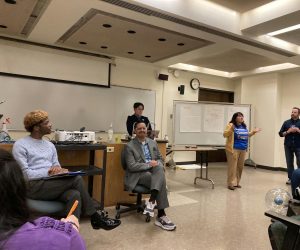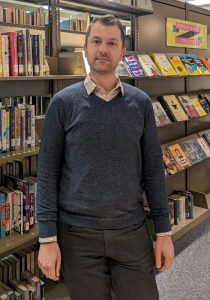Terrorism and media: A fair coverage?
February 21, 2017
In recent years we have witnessed what it seems to be a dramatic rise in the frequency and seriousness of terrorist attacks. We are blasted by an enormous amount of news segments every time a terrorist attack is carried out.
It is too common to see sensational headlines and shocking images on the covers of newspapers and TV news the day after a terrorist attack takes place, exploiting the event as much as possible in order to capture the public’s attention. By making society consume the information they offer, major media outlets are eventually seeking profit, at the end of the day. The information industry is just another kind of business, in which economic values dominate over the journalistic ones.
For this reason terrorist attacks attract the corporate media, who through agenda setting gather all the drama, danger and action that these attacks imply and frame it in a way in order to keep the public interested in consuming what they are offering. By doing this the media eventually see their viewer-ratings and profits increase.
On the other hand, terrorist groups need the media coverage of their attacks in order to be known worldwide so they can spread their ideas and make their targets feel threatened. Their goals are to win the attention of political institutions and influence the decisions made by governments. We could determine that media and terrorist groups have a mutually beneficial relation, as the coverage of terrorist attacks provides media with a massive audience and provides terrorists groups with publicity in order to be known and influence a certain society, by terrorizing it.
However, do major media outlets develop this highly detailed coverage with every terrorist attack, regardless of where it is perpetrated? The answer is a clear no. After witnessing the horrifying episodes that have taken place in Paris, Belgium, Orlando, Istanbul and most recently, Berlin, the general perception of the Western world nowadays is that terrorism has been dramatically increasing throughout the last few years. Nonetheless, as shown by the Global Terrorism Index 2016, the global deaths caused by terrorism in the last year have decreased by 10% compared to the previous year.
Has media covered this decrease? On the contrary, it has focused on the 650% increase of the deaths caused by terrorism that OECD member countries have experienced, proving that Western countries and what happens within them are more likely to gain media’s attention, and thus, to be perceived as “more important” by Western society.
Despite the media discrimination that third world countries suffer, they are still the ones that suffer the most because of terrorism. Iraq, Afghanistan, Nigeria, Pakistan and Syria account for 72% of the total number of deaths caused by terrorism globally. These five countries are followed by 20 other developing countries.
No Western countries appear in that ranking; but according to mainstream media, it seems otherwise.
Very few mainstream information sources will even mention most of the terrorist attacks that occurred in Nigeria, South Sudan or Somalia, which result in more deaths and occur with more frequency than acts of terrorism in Europe or America. Without taking into account the 9-11 events, since 2000, only 0.5% of deaths caused by terrorism have occurred in Western territories.
Major Western mass media outlets won’t offer this perspective to its consumers. Violence in developing countries is sadly considered as routine, not deserving of attention. Media should change its ways of covering these types of events by applying more objectivity and clarity when they deliver information to the audience. Overall, as shown by the Global Terrorism Index 2016, in both OECD and non-OECD countries, terrorism is statistically related to the acceptance of the rights of others, relations with neighbors, likelihood of violent demonstrations and political terror. It is a duty of all politicians, media, society and even violent groups to find the core of the conflict and seek a peaceful solution for it, for the common good.







